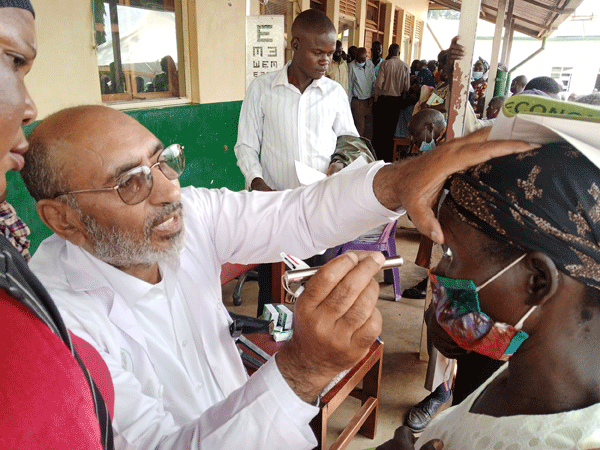Lango battles eye-related issues

An optician examines the eyes of a woman during a free eye check-up and cataract surgery camp at Lira Regional Referral Hospital on August 7. PHOTO / BILL OKETCH
What you need to know:
- Ms Dorcus Ogali, 42, a resident of Adaganwata Village, Barr Sub-county in Lira District, has been suffering from poor vision for the last two years. Unfortunately, she has not received treatment due to financial problems.
Mr Samwiri Obira may become permanently blind if an operation to correct a defect on his eyes proves unsuccessful.
Today, poor vision is the major life-threatening condition for the 90-year-old resident of Abali Village, Alebere Parish, Itek Sub-county in Lira District.
The farmer started experiencing vision loss in 2010.
“When we brought him to Lira hospital in 2012, grandfather was treated at the hospital’s eye department but his condition has not improved,” his granddaughter, Ms Teddy Atim, said.
“Right now he cannot walk or eat without the support of a family member because of his poor vision,” she added.
This is not the only case of visual impairment in Lango Sub-region.
Ms Dorcus Ogali, 42, a resident of Adaganwata Village, Barr Sub-county in Lira District, has been suffering from poor vision for the last two years. Unfortunately, she has not received treatment due to financial problems.
“I feel a lot of pain in my right eye and at 1pm, I don’t see anything at all,” she said.
In 2012, Ms Ogali was diagnosed with high blood pressure at Lira hospital.
“On December 17, 2021, my 17-year-old daughter informed me about the free eye camp at Lira hospital. I then hired a boda boda at Shs5,000 to come for the free eye checkup and cataract surgery but when we arrived at the hospital, eye specialists told us that they could not attend to us because of the increasing cases of Covid-19 in Uganda,” she said.
Mr Mark Iben, 53, an eye patient and a resident of Arwotngo Parish, Okwang Sub-county in Otuke District, said the problem of visual impairment has not spared Otuke.
“In 2021, more than 200 people with different eye diseases from Otuke went for a free eye camp at Lira Regional Referral Hospital but were not attended to because eye specialists had already left,” he said.
Mr Robert Ogwal, 76, a resident of Akongo Village, Okwang Sub-county in Otuke District, said: “I have been suffering from vision loss since December 15, 2018. It started by itching and worsened around October 2021.”
This newspaper has learnt that there is only one ophthalmologist at Lira Regional Referral Hospital handling the entire Lango Sub-region, with a total population of more than 2.1 million people.

For a person with eye problems to be operated on at a private health facility, he or she needs not less than Shs4 million.
For two consecutive times, Pakistan Association Lira with support from Overseas Pakistanis Global Foundation Africa (OPGFA) organised a free eye camp at Lira Regional Referral Hospital.
However, not every patient was lucky to benefit from the programme due to inadequate specialists.
Dr Jane Ruth Aceng, the Minister of Health, said eye diseases have remained a big challenge in Lango. The sub-region consists of Lira, Oyam, Kole, Apac, Dokolo, Otuke, Amolatar, Alebtong and Kwania districts.
She said a huge number of patients turned up to the eye camp at Lira hospital in December 2021 but the specialists left behind a big backlog.
Dr Ahmad Sohail, the Pakistan medical team leader, said there is need for eye care services in Uganda.
“And with your help we will continue to provide the service,” he said.
Mr Hassan Wazir, the Pakistan High Commissioner to Uganda, applauded government for facilitating Pakistan doctors to conduct eye surgeries across the country without difficulty.
“The government of Pakistan wishes to express its utmost happiness to our community living everywhere across the globe. We are proud of them. We take pride in their activities and the Pakistan High Commission in Uganda will always be there to facilitate them to extend best services to the community,” he said.
“I call upon all the people who have abilities to serve the community whether they are in Uganda, whether they are in Pakistan or somewhere else to come forward to assist the people who need the assistance the most,” the ambassador added.
The bigger picture
Ophthalmology remains a neglected public health issue with limited data on the prevalence of visual impairment overall. Uganda’s prevalence of blindness stands at about one percent.
According to the National Population and Housing Census, 2014, northern Uganda accounted for 32 percent of all individuals with visual impairment with 75 percent avoidable blindness.
Poor coverage of basic and secondary level eye care services largely contributed to this.
The situation worsened even more in 2017 due to the increase of South Sudanese refugees and the consequent congestion of the existing eye health facilities, according to Doctors with Africa CUAMM.
In northern Uganda, the common eye diseases include cataract trachoma, onchocerciasis, corneal scars, glaucoma, uveitis and optic nerve error.
However, people who need access to eye care are constrained by the lack of specialist doctors, expensive medication and poor funding to eye health in the region.




